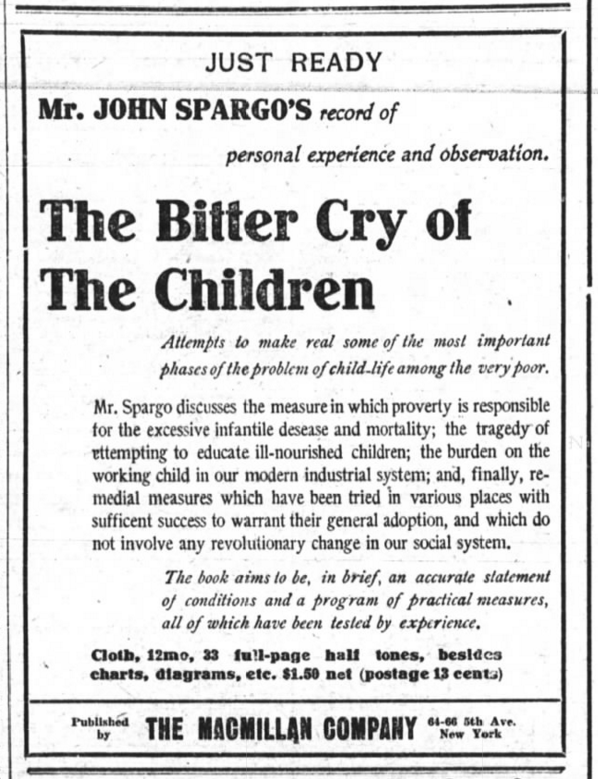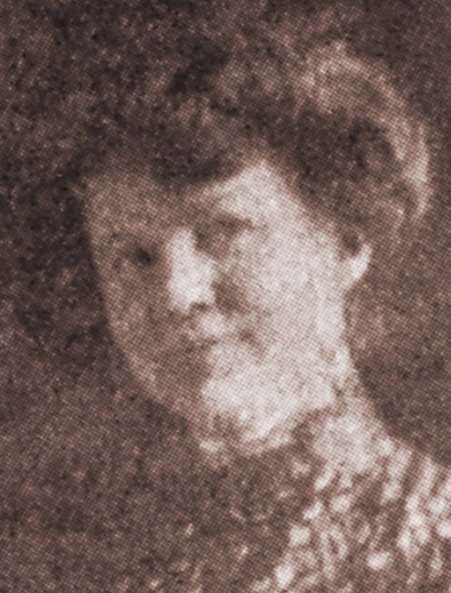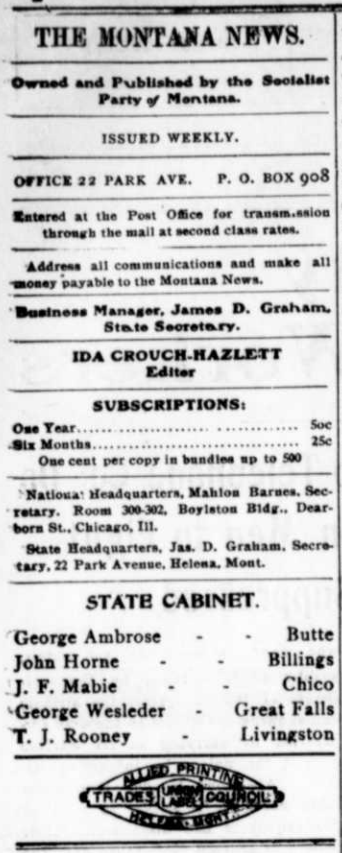
Hellraisers Journal, Friday September 27, 1907
From the Montana News: Ida Crouch-Hazlett Speaks
Socialist Editor Makes Her Voice Heard, September 26, 1907:
Guilty as Charged
—–Mrs. Hazlett Fined by Spokane Judge
For Being Good Speaker-
Appealed to Superior Court
Wednesday, Sept. 18, was the day set by Judge Hide for hearing the arguments of the attorneys upon my case, and rendering his decision. The trains are running so irregularly that to make sure of being in court at two o’clock, I was obliged to take the night train from Rathdrum after the meeting. It should have gone at 11 o’clock, but did not start out till three in the morning. So I was obliged to lose my night’s sleep, although I got several hours after reaching Spokane.
The court room was filled again, with policemen scattered through the working class audience. To be a working man is prima facie evidence of criminal tendencies according to capitalist jurisprudence.
The prosecuting attorney, a redheaded, sharp-eyed fellow with the stamp of a character on his face that must necessarily belong to one who would put in his time perpetrating injustice upon his helpless fellow creatures that are herded in a police court, said with much emphasis that I had violated a city ordinance against any one who would do anything that would have a tendency to obstruct the streets.
Our attorneys were A. Kirby and Comrade Pence. Mr. Kirby made the argument. He showed conclusively that by our 15 witnesses to the prosecution’s two neither the sidewalks nor streets were blockaded. He went over the constitutional right to hold meetings on the street where they were peaceably and interfering with no one. He quoted many authorities and made a fine argument.
After he had closed the prosecuting attorney pulled out from under the table where he had hidden them a steak of law books. So trivial are the silly tricks upon which the great structure of capitalist injustice depends that he acted as though that were the heavy part of his argument to perform a little, trifling schoolboy trick like that, as if perchance he might mystify the defense attorney. There was nothing to his argument whatever. He did not make a single definite point. He acted as though the whole thing were cut and dried anyhow, as it evidently was, and he was just talking to make a show.
The decision was certainly a marvel of judicial, capitalist wisdom. The judge paid no attention to the charge of blockading the streets, admitted that the evidence on that point was all on our side, but said that he would find me guilty on a technicality, and assess merely a nominal fine of $5 and costs. He said where the speaker was a good one and collected a crowd of several thousand people there must evidently be an obstruction. So I was evidently fined for being a good speaker.
We should have opposed the verdict if it bad been one dollar so our attorneys moved for an appeal, and there upon the judge placed my bonds at $150.
This verdict shows what a corrupt and vicious machine the city administration is. The city clerk had told Comrade Thompson, the boy who was fined for “inciting a riot” several days before that they were going to “stick” me. So the conspiracy against me was plainly evident. The whole machine felt sick over making fools of themselves, and inciting the populace as they had done. I had beaten them at every point, had even continued speaking nightly on the streets, and they were determined that they had to make some showing not to become a laughing stock. So the whole push made it up that they would decide against me anyhow, the judge had to do as they said so the whole city graft would stick together, and he could keep a job that gives him a “superior” place in society. All the grafters even came under the iron heel of economic determinism.
The date for the trial in the superior court is not yet set.
Ida Crouch-Hazlett
———-
[Photograph added.]
Mrs. Hazlett Takes on the Helena Independent:
FRANTIC EDITORS
The arrest and trial of Mrs. Hazlett has proved a veritable paradise for pickaninny capitalist editors throughout the northwest who think that they will completely obliterate socialism by exploding their popguns at it. The Montana News and its supporters have been a thorn in the flesh to every newspaper in the state ever since its inception, because it is the only paper in the state that tells the truth in regard to the working class and all progressive social ideas.
Our old friend, the enemy, in other words, the Helena Independent, has been particularly virulent, as might have been expected, in attacking Mrs. Hazlett and misrepresenting the socialist position. Its latest spasm is a shriek at Clarence Darrow because he refused to rise and bemean himself like a heathen before his fetish when the national anthem was rendered by the orchestra in a Spokane cafe.
The Independent may well shriek because the working class and those who espouse and push on their cause for justice and opportunity, are refusing to tamely repeat and prostrate themselves before the shibboleths that are the symbols of a government that rests on the bitter oppression of those that do the work that makes civilization possible.
Socialists, and all intelligent, progressive and scientific thinkers do not approve of this sort of a government—of the capitalists, by the capitalists, and for the capitalists. They are doing everything in their power to establish a better system of government. When the national anthem prates of “sweet land of liberty.” with its flag floating over almhouses, bull-pens, penitentiaries and police courts, people who think have no desire to do homage to an ignorant farce. Clarence Darrow is a thinker. He doesn’t shout with the ignorant crowd that shouts because somebody else shouts, and starves the next day. He has the manhood and backbone to stand always for what he believes in. It is an empty barrel that makes the biggest noise, and those that are yelling for “patriotism” have the least conception of what a good government ought to be. They seek to drown by their insane gabble the moans of the starving and the hurt. The starvation process is equally painful under any flag.
When we get a government that the people control and not the tough political bosses, then we will sing its anthems and honor its emblems. Till then please excuse us, Mr. Amalgamated-money Independent.
But the Independent’s hysterics on the educational question, based on some remarks of Mrs. Hazlett’s at a meeting in Spokane are a typical illustration of the bourgeois attitude toward the subject of popular and universal education. This sheet that is known to lend itself to anything in the interest of the capitalist bosses and against the struggle of the laboring class, takes especial umbrage because Mrs. Hazlett stated that the working class cannot go to the universities, that only the capitalist class can educate their sons at these institutions, and that the workers must work to keep these capitalist young men there. It asserts that any industrious, ambitious young man or woman can go to a university.
This is what bourgeois thought is continually saying. Let us examine the claim.
In the first place Mrs. Hazlett did not state that any single young man or woman from the ranks of the working class, or even many individuals could not manage occasionally, by hook and crook, to squeeze through a university. She said the working class could not go to universities, that they were busy supporting the capitalist class while they availed themselves of these luxuries.
It is amazing what little ability people who are trained in capitalist methods of thought have of analyzing a subject scientifically. They still work in the old individualistic, single instance way, as though they had never heard of the gathering of statistics that cover a mass of general data, and constitute the modern dialectic method of acquiring an accurate information.
Less than one per cent of the children born in the nation ever enter a higher institution of learning. Jacob Riis stated that there were 50,000 more children in New York city than there were schoolrooms provided for them, and the percentage is equally bad in Chicago.
The alarming disclosures by the Salvation Army of the 80,000 children in New York who go breakfastless to school, and whose bodies were in such a weak condition from malnutrition that they were unable to concentrate their minds on the work, or make any perceptible mental progress, are familiar to all intelligent readers. If not the facts may be found in John Spargo’s “Bitter Cry of the Children,” a book largely in use in our universities.
The working class are deprived of educational advantages, not because they would not like them, but because they haven’t the money to get them; and the majority of men throughout this whole western country, many of them to-day prosperous business men, will testify that this was true in their case. Dozens have repeated this to me since the Independent article was written.
Here and there a boy or girl may push through if they are not confronted by obstacles that are too great.
But the working man who lives by his day’s wages, and these constitute 80 per cent of the population, who are making the material things and doing the actual work that makes civilization possible, by the time he pays his rent, grocery bills, maintains of family of five children, buys clothing, pays doctors’ bills and an occasional funeral bill, gets injured and laid off in the industries, or is called out on strikes, or pushed out by the introduction of a machine in his trade, has no surplus to buy university educations for his children, and everybody knows this—even the dopey editor of the Independent.
Most of the children of the working class leave school at the age of 12 or 14 to join the ranks of the workers, and become breadwinners to piece out the support of the family for which the father’s wages are not adequate. To talk of such people becoming university educated is the rankest nonsense.
It is only the occasional working class boy, unusually bright and energetic, or whose parents are not hopelessly crushed by circumstances, that can make the struggle. Just three per cent ever get out of the working class. The other 97 per cent have to stay and perform the social drudgery that the few may live in comfort and plenty.
The Independent says that the poor young men outnumber the young men of wealth in our universities. The writer can assert that this is not true from individual personal experience. It is simply one of those wild statements made without any inquiry into the real facts of the case.
The majority of those attending any higher institutions are not from the ranks of those whose parents work for wages. The most superficial inquiry will satisfy the mind as to this point. If there is a student from these ranks in the college, he is usually pointed out as a curiosity.
The most assuming part of the Independent’s explosion is where it states that CAPITAL puts up every building and pays for everything connected with a university. No one, although he might look till his eyes were blind, ever saw anything putting up a university building except labor. These laborers are even fed by the labor of others. The writer doesn’t seem to have the slightest conception of what capital is, and is in a poor position to write on economics when he doesn’t even know the meaning of the fundamental terms.
Capital is wealth used in the creation of other wealth.
Wealth is material things produced by labor.
So we come back to tho thesis that labor makes everything connected with a university, even feeds and clothes the professors.
The Independent makes much of the fact that taxes on property do this. Taxes are the part of the wealth that labor has created, that the capitalist has been forced to cough up from the vast surplus that he has stolen from labor, and restore to society in the way of public institutions.
Under a socialist government the capitalist would be compelled to cough up all of this in the way of public baths, gymnasiums, schools, etc., and all children maintained through the highest institutions of learning at the public expense. In other words, there wouldn’t be any capitalists.
These are the things that Mrs. Hazlett knows—not the slush that the Independent says she knows. When the majority know these things an ignorant society will be no more.
Ida Crouch-Hazlett.
———-
SOURCE
Montana News
“Owned and Published by the Socialist Party of Montana”
-Sept 26, 1907
http://chroniclingamerica.loc.gov/lccn/sn84024811/1907-09-26/ed-1/seq-1/
http://chroniclingamerica.loc.gov/lccn/sn84024811/1907-09-26/ed-1/seq-2/
IMAGES
Ida Crouch-Hazlett, wiki, Montana News, Aug 3, 1904
https://en.wikipedia.org/wiki/Ida_Crouch-Hazlett
http://chroniclingamerica.loc.gov/lccn/sn84024811/1904-08-03/ed-1/seq-1/
Montana News, Helena, MT SP, Editor Hazlett, Sept 26, 1907
http://chroniclingamerica.loc.gov/lccn/sn84024811/1907-09-26/ed-1/seq-2/
Bitter Cry of Children, Spargo, NYT, Feb 17, 1906
https://www.newspapers.com/image/20459100/
See also:
Note: The Helena Independent was the same newspaper which, ten years later, heartily approved of the lynching of Frank Little.
Hellraisers Journal, Friday August 3, 1917
Butte, Montana – Union Men Arm for Self Defense
Frank Little Lynched in Butte; Note Threatens: “Others Take Notice! First and Last Warning!”
From the Helena Independent of August 2, 1917:
Some are hoping for more deaths among the striking miners. Apparently the 166 who died in the Speculator Mine Fire last June were not enough to satisfy their blood-lust.
Editorial by Will Campbell
Considerably more than two thousand copies of an extra Independent were sold in an hour or less [August 1st]. It was just at noon when the violent death of Little became known. Groups of businessmen, workers, women and officials gathered here and there. There was but one comment heard.
“Good work; Let them continue to hang every I.W.W. in the state.”
It is the failure of the courts and the military authorities to act which has caused the numbers “3-7-77” to again appear in Montana, and without boasting of the condition, the Independent is convinced that unless the courts and the military authorities take a hand now and end the I.W.W. in the west, there will be more night visits, more tugs at the rope and more I.W.W. tongues will wag for the last time when the noose tightens about the traitor’s throats.
[….]
It sort of quickens the blood in the veins of some of the pioneers of Helena to see once more the fatal figures in print-“3-7-77.”
[Emphasis added.]
———-

The Bitter Cry of the Children
-by John Spargo
(1st edition 1906)
Macmillan, 1909
https://archive.org/stream/bittercryofchild00sparuoft#page/n7/mode/2up
From History Matters
http://historymatters.gmu.edu/d/5571/
No Rest for the Weary: Children in the Coal Mines
For early twentieth-century Progressive reformers committed to social justice, widespread child labor—especially in coal mines, textile mills, and department stores—was particularly disturbing. And as with other Progressive crusades, the exposé was a favorite tool. Probably the most influential and certainly the most widely read of the Progressive-era exposés of child labor was John Spargo’s The Bitter Cry of the Children (1906). Spargo was a British granite cutter who became a union organizer and socialist and gained his formal education through extension courses at Oxford and Cambridge. In 1901, he emigrated to the United States where he became a leader of the conservative wing of the American Socialist Party [Socialist Party of America-SPA]. In the following excerpt, Spargo described work at the coal breaker, the area outside the mine where coal was sorted and graded, mostly by young children.
Work in the coal breakers is exceedingly hard and dangerous. Crouched over the chutes, the boys sit hour after hour, picking out the pieces of slate and other refuse from the coal as it rushes past to the washers. From the cramped position they have to assume, most of them become more or less deformed and bent-backed like old men. When a boy has been working for some time and begins to get round-shouldered, his fellows say that “He’s got his boy to carry round wherever he goes.”
The coal is hard, and accidents to the hands, such as cut, broken, or crushed fingers, are common among the boys. Sometimes there is a worse accident: a terrified shriek is heard, and a boy is mangled and torn in the machinery, or disappears in the chute to be picked out later smothered and dead. Clouds of dust fill the breakers and are inhaled by the boys, laying the foundations for asthma and miners’ consumption.
I once stood in a breaker for half an hour and tried to do the work a twelve-year-old boy was doing day after day, for ten hours at a stretch, for sixty cents a day. The gloom of the breaker appalled me. Outside the sun shone brightly, the air was pellucid [clear], and the birds sang in chorus with the trees and the rivers. Within the breaker there was blackness, clouds of deadly dust enfolded everything, the harsh, grinding roar of the machinery and the ceaseless rushing of coal through the chutes filled the ears. I tried to pick out the pieces of slate from the hurrying stream of coal, often missing them; my hands were bruised and cut in a few minutes; I was covered from head to foot with coal dust, and for many hours afterwards I was expectorating some of the small particles of anthracite I had swallowed…..


